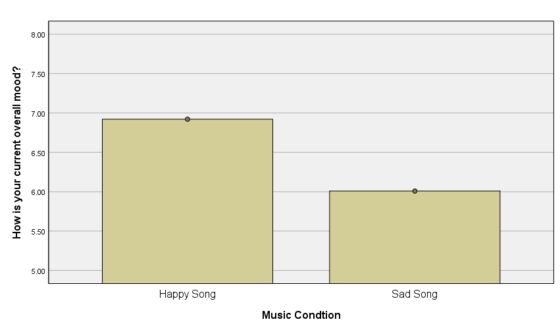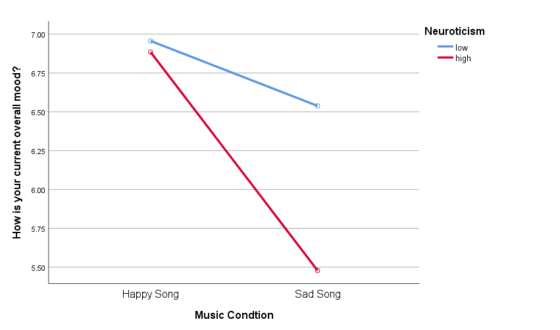Nina Amato, Hailey Davis, Emily Deeds, Kinsey Overfelt, Valerie Spasojevic (Advisor Chris Buchholz)


Background Information
Music has been around for centuries and it has been used in many different ways, from ceremonies, to dancing, or even to uplift the soul. Philosophers have wondered what the purpose of music is and what it does for us. Many people believe that music can affect their mood – we were curious about this as well and wanted to take it a step further to see if happy or sad music was able to change ones mood when combined with having a certain personality trait. We predicted that people with a high level of Neuroticism would have their mood shifted the most due to the type of music they were listening to. We predicted that this specific personality trait would be most likely to change their mood due to the type of music because it is said that people with the personality trait of Neuroticism tend to be emotionally unstable, which would allow their mood to shift easily. To examine the effects, we used different tests in order to assess how a happy song and a sad song affected the moods of different personalities. Specifically, we predicted that people having a personality high in Neuroticism will convey a happier mood in the happy music group, as well as convey a sadder mood in the sad music group. We also predicted that those who are low in neuroticism will not have their mood as affected by the music since they are in theory more emotionally stable individuals.
Methods
Participants were randomly assigned to one of two conditions in the study, either listening to a happy or sad version of the same song. Individuals then self-reported their mood via a slider scale immediately after listening to the song condition to which they were assigned. Participants then took the Big Five Inventory (BFI) questionnaire to measure personality traits (e.g., neuroticism).
Results and Discussion
There was a significant difference between the moods of the people in the sad condition versus the happy condition (see Figure 1). Also, in line with our predictions, we found that those high in neuroticism did have a significant difference between their reactions to happy versus sad music, while this was not the case for those low in neuroticism (see Figure 2).

Figure 1: The effect of music on mood.

Figure 2: Interaction effects between music condition and neuroticism.
Reflection
We experienced challenges throughout our research because we anticipated our study to be conducted in a lab setting, not completely online. We originally decided that we wanted to have an in-person study so we could ensure that individuals would listen to the song entirely and not have any distractions, however, we had to switch to an online version of our study due to the Coronavirus. Our study also does not take into account the mood the individual was already experiencing, which could have impacted mood persuasion.